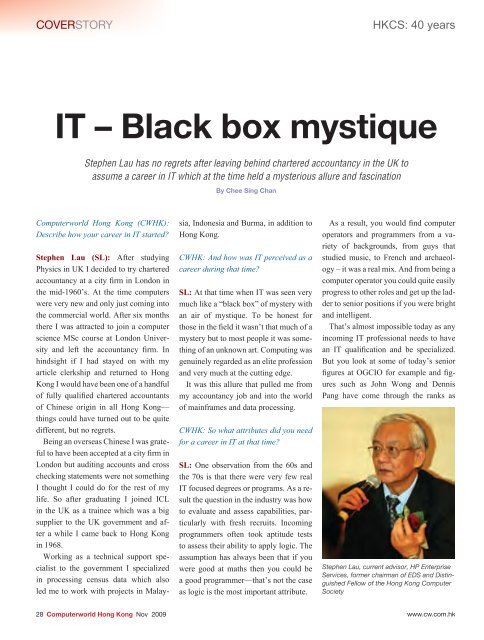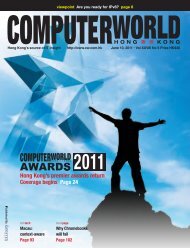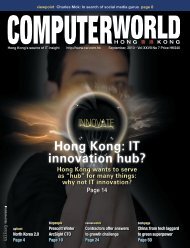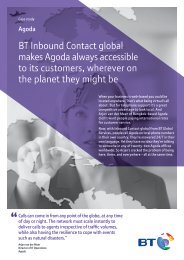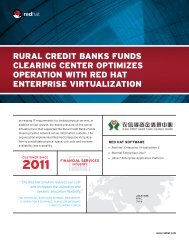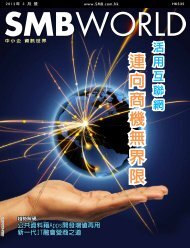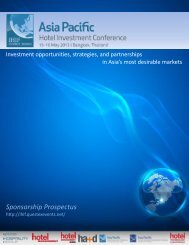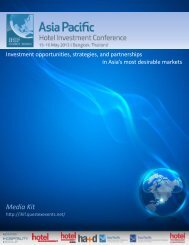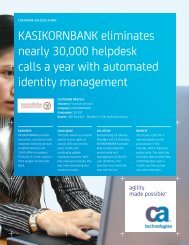Hong Kong Computer Society - enterpriseinnovation.net
Hong Kong Computer Society - enterpriseinnovation.net
Hong Kong Computer Society - enterpriseinnovation.net
You also want an ePaper? Increase the reach of your titles
YUMPU automatically turns print PDFs into web optimized ePapers that Google loves.
COVERSTORY<br />
HKCS: 40 years<br />
IT – Black box mystique<br />
Stephen Lau has no regrets after leaving behind chartered accountancy in the UK to<br />
assume a career in IT which at the time held a mysterious allure and fascination<br />
By Chee Sing Chan<br />
<strong>Computer</strong>world <strong>Hong</strong> <strong>Kong</strong> (CWHK):<br />
Describe how your career in IT started?<br />
Stephen Lau (SL): After studying<br />
Physics in UK I decided to try chartered<br />
accountancy at a city firm in London in<br />
the mid-1960’s. At the time computers<br />
were very new and only just coming into<br />
the commercial world. After six months<br />
there I was attracted to join a computer<br />
science MSc course at London University<br />
and left the accountancy firm. In<br />
hindsight if I had stayed on with my<br />
article clerkship and returned to <strong>Hong</strong><br />
<strong>Kong</strong> I would have been one of a handful<br />
of fully qualified chartered accountants<br />
of Chinese origin in all <strong>Hong</strong> <strong>Kong</strong>—<br />
things could have turned out to be quite<br />
different, but no regrets.<br />
Being an overseas Chinese I was grateful<br />
to have been accepted at a city firm in<br />
London but auditing accounts and cross<br />
checking statements were not something<br />
I thought I could do for the rest of my<br />
life. So after graduating I joined ICL<br />
in the UK as a trainee which was a big<br />
supplier to the UK government and after<br />
a while I came back to <strong>Hong</strong> <strong>Kong</strong><br />
in 1968.<br />
Working as a technical support specialist<br />
to the government I specialized<br />
in processing census data which also<br />
led me to work with projects in Malay-<br />
sia, Indonesia and Burma, in addition to<br />
<strong>Hong</strong> <strong>Kong</strong>.<br />
CWHK: And how was IT perceived as a<br />
career during that time?<br />
SL: At that time when IT was seen very<br />
much like a “black box” of mystery with<br />
an air of mystique. To be honest for<br />
those in the field it wasn’t that much of a<br />
mystery but to most people it was something<br />
of an unknown art. Computing was<br />
genuinely regarded as an elite profession<br />
and very much at the cutting edge.<br />
It was this allure that pulled me from<br />
my accountancy job and into the world<br />
of mainframes and data processing.<br />
CWHK: So what attributes did you need<br />
for a career in IT at that time?<br />
SL: One observation from the 60s and<br />
the 70s is that there were very few real<br />
IT focused degrees or programs. As a result<br />
the question in the industry was how<br />
to evaluate and assess capabilities, particularly<br />
with fresh recruits. Incoming<br />
programmers often took aptitude tests<br />
to assess their ability to apply logic. The<br />
assumption has always been that if you<br />
were good at maths then you could be<br />
a good programmer—that’s not the case<br />
as logic is the most important attribute.<br />
As a result, you would find computer<br />
operators and programmers from a variety<br />
of backgrounds, from guys that<br />
studied music, to French and archaeology<br />
– it was a real mix. And from being a<br />
computer operator you could quite easily<br />
progress to other roles and get up the ladder<br />
to senior positions if you were bright<br />
and intelligent.<br />
That’s almost impossible today as any<br />
incoming IT professional needs to have<br />
an IT qualification and be specialized.<br />
But you look at some of today’s senior<br />
figures at OGCIO for example and figures<br />
such as John Wong and Dennis<br />
Pang have come through the ranks as<br />
Stephen Lau, current advisor, HP Enterprise<br />
Services, former chairman of EDS and Distinguished<br />
Fellow of the <strong>Hong</strong> <strong>Kong</strong> <strong>Computer</strong><br />
<strong>Society</strong><br />
28 <strong>Computer</strong>world <strong>Hong</strong> <strong>Kong</strong> Nov 2009 www.cw.com.hk


